- Last Updated: January 15th, 2026
Key Takeaways
Social media addiction in the workplace is becoming increasingly prevalent, leading to decreased productivity, increased absenteeism, and reduced work quality.
Employers can address social media addiction by implementing clear policies, providing employee education, and fostering a balanced work-life culture that encourages breaks and offline activities.
As technology advances, ongoing research and evidence-based interventions are crucial to understanding and mitigating the impact of social media addiction on workplace productivity and employee well-being.
Overview of Social Media Addiction Workplace Productivity
On this page, we’ll discuss social media addiction workplace productivity, how social media addiction can impact job performance, factors contributing to social media addiction at work, and much more.
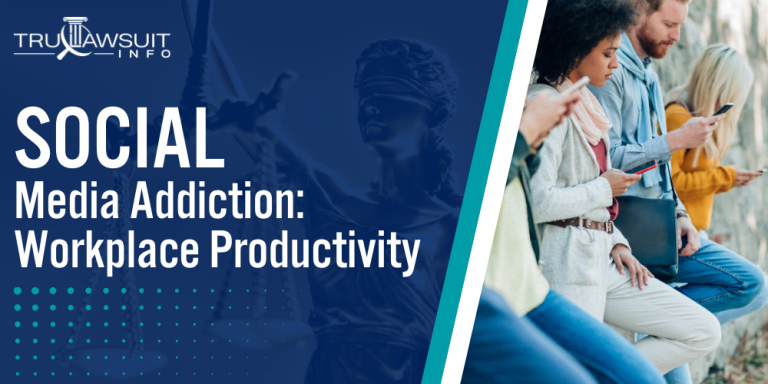
Intro to Social Media Addiction Workplace Productivity
Some of the key aspects of Social Media Addiction Workplace Productivity include, but are not limited to:
- Decreased Productivity: Employees addicted to social media may spend excessive time on these platforms during work hours, decreasing productivity.
- Distraction and Errors: Social media addiction can lead to distraction and an increased likelihood of errors in work tasks.
- Employer Responsibility: Employers have a responsibility to address social media addiction in the workplace and provide resources for affected employees.
If your workplace productivity has suffered due to social media addiction, it’s important to seek help and understand your legal rights.
Contact TruLawsuit Info today using the chat on this page to receive an instant case evaluation.
The Growing Problem of Social Media Addiction in the Workplace
Social media addiction in the workplace is becoming increasingly prevalent, leading to a significant dip in employee productivity.
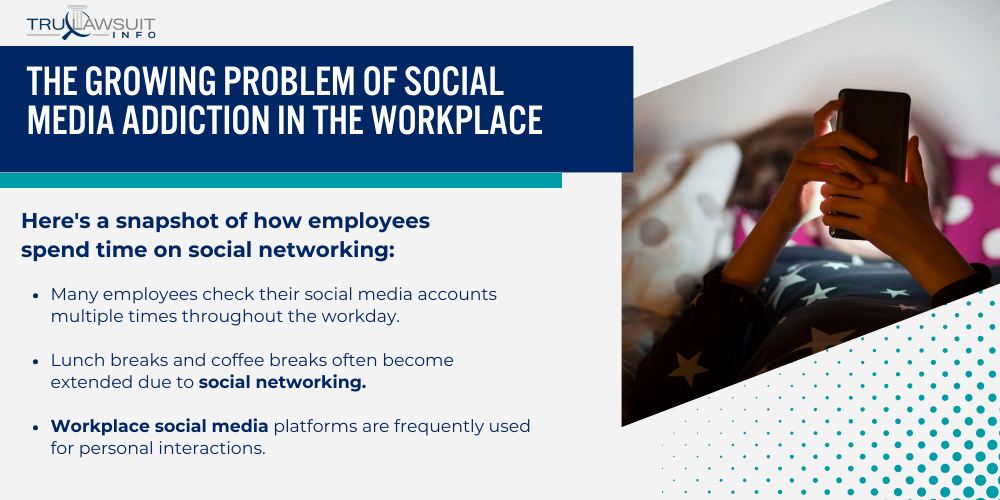
It raises concerns about the efficient use of work hours and the ability of employees to maintain focus.
Prevalence of Social Media Use During Work Hours
Social media usage during work hours is not an uncommon phenomenon.
Here’s a snapshot of how employees spend time on social networking:
- Many employees check their social media accounts multiple times throughout the workday.
- Lunch breaks and coffee breaks often become extended due to social networking.
- Workplace social media platforms are frequently used for personal interactions.
- Notifications from social media apps distract employees from work-related information and tasks.
Negative Effects on Employee Focus and Efficiency
One significant consequence is the disruption of the traditional workday, as employees may find themselves more engaged with personal interests than their professional responsibilities.
This diversion can lower morale and increase stress, as workers struggle to catch up on their duties and feel overwhelmed by an ever-growing workload.
The intrusion of social media into the workplace has tangible negative impacts on work productivity and employee focus:
- Continuous social media use fragments attention and leads to frequent switching between work tasks and personal browsing.
- Research interests indicate that the time spent on social media during work can equate to a loss of two hours of productivity per day.
- Work productivity declines as employees become consumed with social media usage, leading to missed deadlines and poor work quality.
- The habit of checking social media can create a compulsion, reducing an employee’s ability to engage deeply with work projects.
Factors Contributing to Social Media Addiction at Work
In the workplace, social media addiction detracts from productivity and performance.
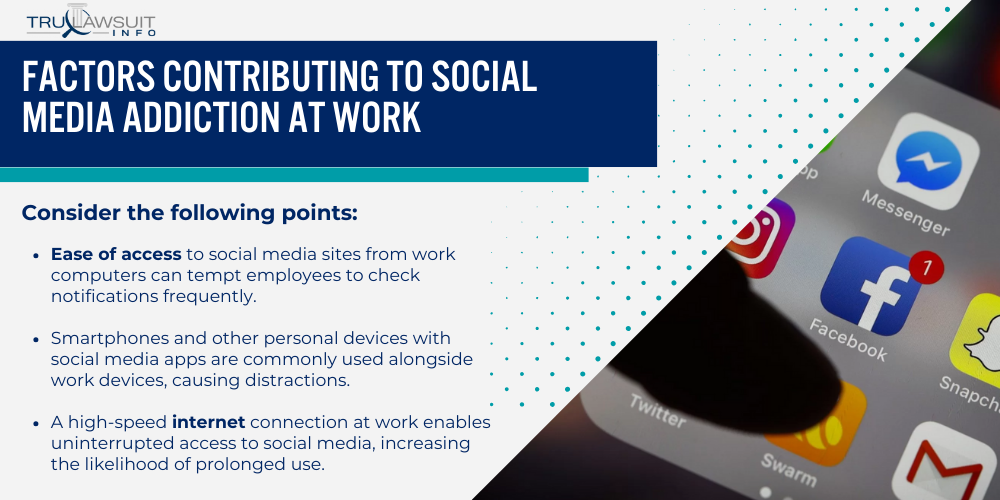
Understanding its contributing factors is necessary for effective intervention and human resource management.
Accessibility of Social Media Platforms on Work Devices
Employees often utilize social media platforms on their work devices, which can lead to internet addiction during work hours.
Consider the following points:
- Ease of access to social media sites from work computers can tempt employees to check notifications frequently.
- Smartphones and other personal devices with social media apps are commonly used alongside work devices, causing distractions.
- A high-speed internet connection at work enables uninterrupted access to social media, increasing the likelihood of prolonged use.
- Employee workstations typically have minimal supervision, providing opportunities to engage with social media unnoticed.
Lack of Clear Company Policies Regarding Social Media Use
The absence of explicit policies regarding workplace social media use can contribute to social media addiction.
Important aspects include:
- Without clearly defined guidelines, employees may not understand acceptable limits for social media use at work.
- Inconsistencies in policy enforcement can lead to confusion and uneven application across different departments.
- A lack of training on the impact of excessive social media use on work performance may lead to underestimating its effects.
- Human resource departments might not have the resources or protocols to monitor or address social media usage effectively.
Consequences of Social Media Addiction on Workplace Productivity
Social media addiction in the workplace leads to notable decreases in work productivity.
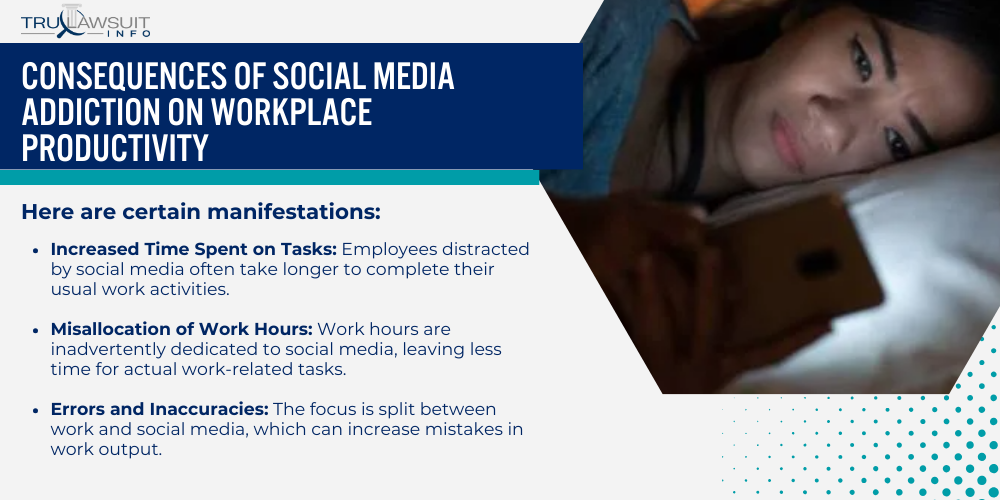
When employees spend work hours on non-work-related social media, it directly affects both job performance and output quality.
Decreased Work Output and Quality
Social media use during work hours is linked to reduced efficiency in completing tasks.
Here are certain manifestations:
- Increased Time Spent on Tasks: Employees distracted by social media often take longer to complete their usual work activities.
- Misallocation of Work Hours: Work hours are inadvertently dedicated to social media, leaving less time for actual work-related tasks.
- Errors and Inaccuracies: The focus is split between work and social media, which can increase mistakes in work output.
- Lowered Quality: When attention is diverted, the quality of work suffers, potentially impacting customer satisfaction and business operations.
Increased Absenteeism and Presenteeism
Being preoccupied with social media can impact work quality and timeliness, as well as human resource management in terms of attendance and engagement.
This influence can be seen in several workplace trends:
- Higher Rates of Absenteeism: Social media addiction can lead to mental fatigue and lack of motivation, causing employees to take more time off.
- Decreased Engagement: Physically present but mentally distracted employees contribute less during work hours.
- Reduced Participation In Work Activities: Employees might engage with social media rather than participate in team collaborations or meetings.
- Increased Health Issues: Overusing social media may be associated with higher stress levels, which can lead to health problems and additional sick leave.
Identifying Signs of Social Media Addiction in Employees
It’s important for employers to recognize the impact that social media addiction can have on workplace productivity.
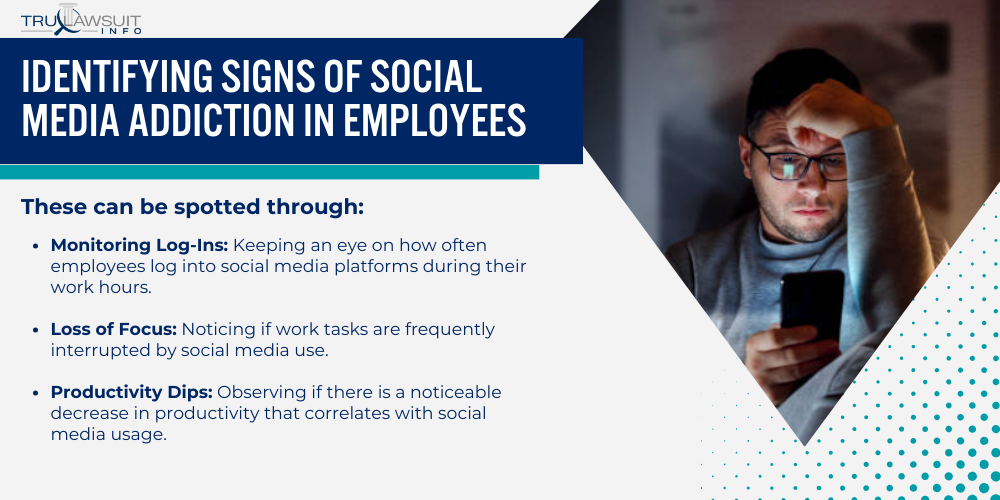
Pinpointing signs of addiction in employees is the first step in addressing this issue.
Excessive Time Spent on Social Media During Work Hours
Employees showing tendencies toward social media addiction might exhibit certain behaviors.
These can be spotted through:
- Monitoring Log-Ins: Keeping an eye on how often employees log into social media platforms during their work hours.
- Loss of Focus: Noticing if work tasks are frequently interrupted by social media use.
- Productivity Dips: Observing if there is a noticeable decrease in productivity that correlates with social media usage.
- Neglected Responsibilities: When essential tasks are being sidelined in favor of social interaction.
Withdrawal Symptoms When Unable to Access Social Media
Withdrawal symptoms can manifest when employees with social media addiction are restricted from their usual habits.
They might display:
- Irritability: Becoming easily annoyed or agitated when social media access is not available.
- Anxiety: Demonstrating unease or nervousness when they are unable to check their social accounts.
- Distraction: Showing a lack of concentration or preoccupation with getting back online.
- Discomfort: Expressing uneasiness or restlessness during periods when social media is inaccessible.
Strategies for Addressing Social Media Addiction in the Workplace
Social media addiction can significantly impact workplace productivity.
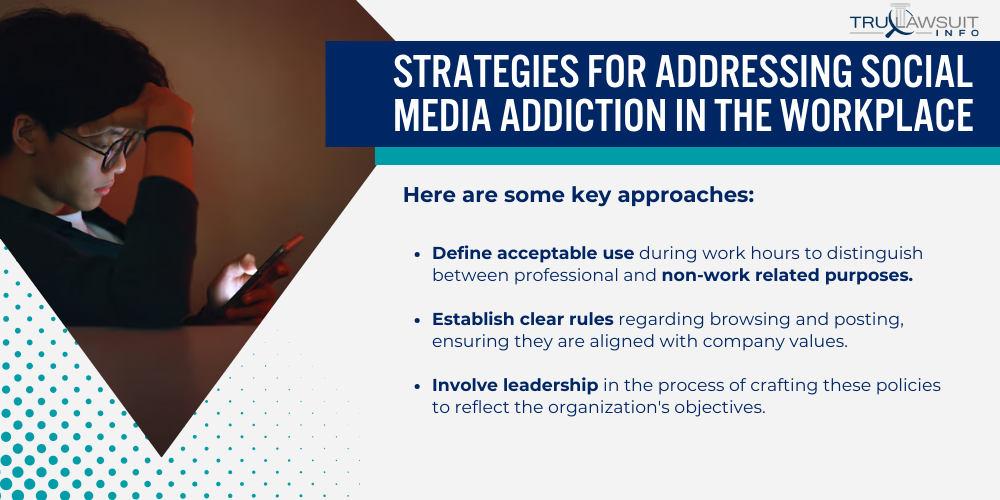
Effective strategies involve a combination of policy implementation and educational initiatives.
Implementing Clear Social Media Policies and Guidelines
Policies and guidelines play a fundamental role in maintaining a balance of social media use in the workplace.
Here are some key approaches:
- Define acceptable use during work hours to distinguish between professional and non-work related purposes.
- Establish clear rules regarding browsing and posting, ensuring they are aligned with company values.
- Involve leadership in the process of crafting these policies to reflect the organization’s objectives.
- Review and update policies regularly to address the evolving nature of social media platforms.
Employers should communicate these policies effectively to ensure everyone understands their role in upholding them.
Providing Employee Education and Awareness Programs
Proactive educational efforts can limit inappropriate social media use in the workplace while fostering a responsible corporate culture.
Consider the following measures:
- Develop awareness programs that highlight the potential negative consequences of social media overuse.
- Incorporate training sessions in human resource development to educate employees about healthy social media habits.
- Offer resources that assist in identifying signs of addiction and strategies for self-regulation.
- Encourage open dialogue about social media use to destigmatize discussions around social media addiction.
Education and awareness are essential in empowering employees to make informed decisions about their social media consumption.
The Role of Employers in Promoting Healthy Social Media Use
Employers can shape the landscape of social media use in the workplace.
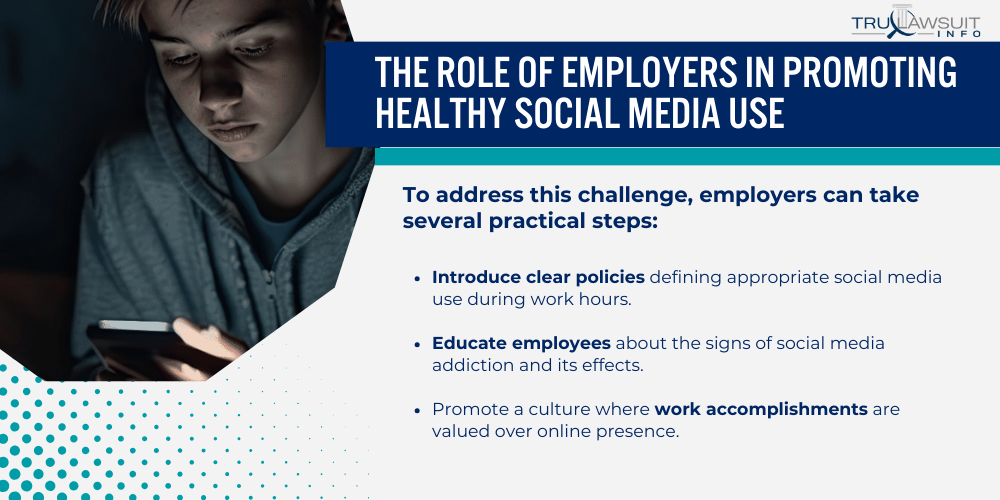
Setting clear policies and fostering an environment that values work-life balance can help mitigate the risks of social media addiction and its impact on productivity.
Fostering a Balanced Work-Life Culture
Employers can actively create a workplace culture that prioritizes the well-being of their employees.
This involves acknowledging that the lines between professional and personal lives are becoming increasingly blurred due to social media’s omnipresence.
To address this challenge, employers can take several practical steps:
- Introduce clear policies defining appropriate social media use during work hours.
- Educate employees about the signs of social media addiction and its effects.
- Promote a culture where work accomplishments are valued over online presence.
- Encourage managers to lead by example, showing that productivity isn’t measured by constant online availability.
Encouraging Breaks and Offline Activities
Employers should encourage their teams to disconnect and engage in other non-work-related activities that can lead to a healthier lifestyle.
Here are some effective strategies to encourage offline activities and breaks:
- Implement mandatory break times for employees to step away from their screens.
- Organize team-building activities that foster community and connection away from digital platforms.
- Offer resources or programs on time management that include managing social media use.
- Create quiet zones within the workplace where employees can relax without digital interruptions.
Balancing the Benefits and Risks of Social Media in the Workplace
In the modern workplace, social media presents both a powerful tool for professional growth and a possible hindrance to productivity.
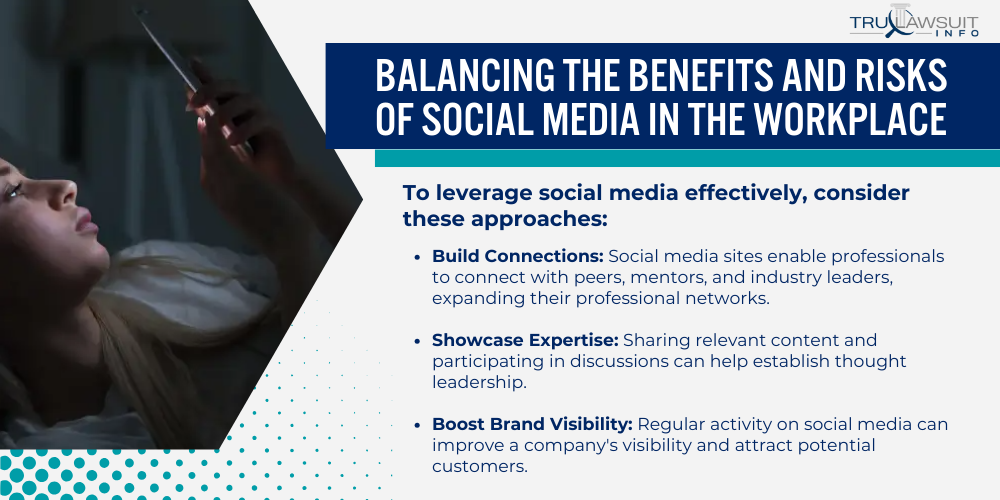
Employers and employees must navigate its duality with an informed approach.
Leveraging Social Media for Professional Networking and Marketing
Social media has a significant impact when harnessed for professional networking and marketing.
These platforms allow businesses and professionals to reach a wider audience daily with relative ease.
A tailored social media strategy can enhance an individual’s or company’s presence and credibility.
To leverage social media effectively, consider these approaches:
- Build Connections: Social media sites enable professionals to connect with peers, mentors, and industry leaders, expanding their professional networks.
- Showcase Expertise: Sharing relevant content and participating in discussions can help establish thought leadership.
- Boost Brand Visibility: Regular activity on social media can improve a company’s visibility and attract potential customers.
- Track Trends: Monitoring social media updates helps professionals stay current with industry trends and innovations.
Mitigating the Negative Impact on Productivity and Well-being
While the benefits are clear, unrestricted use of social media in the workplace can negatively impact employee well-being and overall productivity.
Companies should encourage responsible use and be proactive in addressing potential risks.
To mitigate these negative effects, companies can implement the following practices:
- Set Clear Guidelines: Establishing company policies on social media use during work hours can prevent overuse.
- Encourage Breaks: Regular breaks away from the desk and social media can reduce stress and prevent burnout.
- Provide Training: Educating employees on the benefits and pitfalls of social media use can empower them to make better choices.
- Monitor Usage Patterns: Understanding when and how employees use social media can help identify problems and solutions.
The Future of Social Media Addiction and Workplace Productivity
In considering the trajectory of social media addiction within the workplace, focusing on the intersection of emerging technology and workplace productivity is essential.
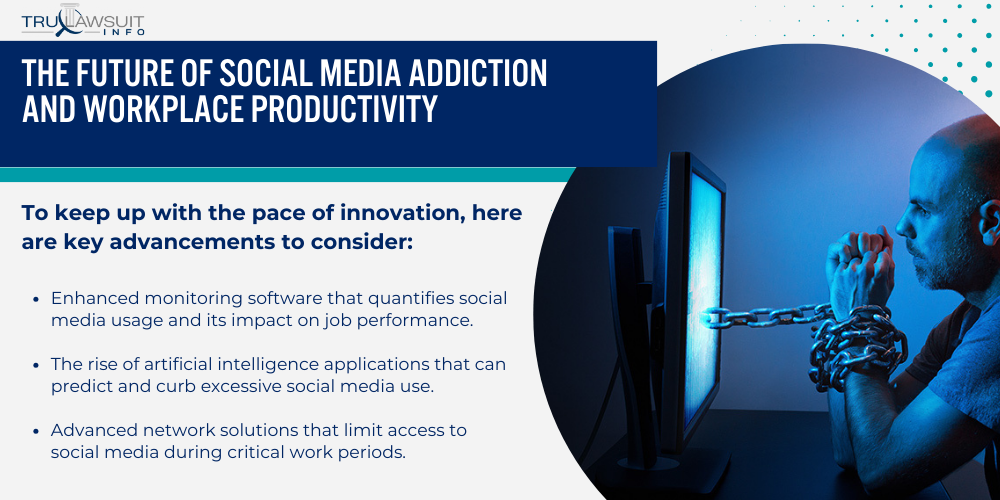
Each will undeniably impact how organizations approach employee well-being and efficiency.
Emerging Trends and Technological Advancements
The intersection of emerging technology and social media addiction points to developing sophisticated analytical tools.
These tools are aimed at monitoring employee usage patterns in real time.
To keep up with the pace of innovation, here are key advancements to consider:
- Enhanced monitoring software that quantifies social media usage and its impact on job performance.
- The rise of artificial intelligence applications that can predict and curb excessive social media use.
- Advanced network solutions that limit access to social media during critical work periods.
- Employee training programs utilizing virtual reality to simulate the consequences of social media addiction.
Importance of Ongoing Research and Evidence-Based Interventions
The role of numerous case studies and ongoing research is imperative in formulating strategies to address social media addiction in the workplace.
For evidence-based interventions to be successful, they must be grounded on solid research models and actual workplace data.
The plan is to get ahead of potential productivity downturns associated with addictive behaviors.
Here’s what’s being looked at:
- Holistic approaches to understanding psychological triggers linked to social media use within occupational environments.
- Long-term studies that assess the efficacy of workplace interventions on reducing social media addiction.
- Continuous analysis of the impact of social media on work-life balance and employee burnout.
- Assessments of communication tools that are work-appropriate and can replace the need for social media during office hours.
Frequently Asked Questions
-
Employees using social media during work hours typically leads to distractions and a decline in focus.
Research suggests that these distractions can cumulatively result in significant productivity losses as tasks take longer to complete and errors become more frequent.
-
Recent studies have shown that excessive social media use in the workplace is associated with reduced efficiency.
For instance, findings indicate that employees spending time on social media may report lower completion rate and higher workday interruption levels.
-
Social media can positively impact workplace productivity, particularly when it aids in professional networking, knowledge sharing, and team communication.
These benefits are typically observed in work environments that strategically integrate social media tools for collaboration and learning.
-
Organizations can mitigate the negative impact of social media by establishing clear usage policies, offering training on digital literacy, and promoting time management skills.
Additionally, they can invest in fostering a company culture that prioritizes goal-oriented behaviors.
-
Social media addiction can undermine work ethic by encouraging procrastination and diminishing an individual’s commitment to job responsibilities.
Consequently, it can lead to delayed project deadlines and a decrease in the overall quality of work output.
-
Employers can track work completion rates to assess when social media use turns detrimental.
They can also monitor changes in work quality, analyze communication patterns, and observe any shifts in employee engagement.
Regular performance reviews can also highlight the effects of social media on work.

Attorney Jessie Paluch, founder of TruLawsuit Info, has over 25 years of experience as a personal injury and mass tort attorney, and previously worked as an international tax attorney at Deloitte. Jessie collaborates with attorneys nationwide — enabling her to share reliable, up-to-date legal information with our readers.
Legally Reviewed
This article has been written and reviewed for legal accuracy and clarity by the team of writers and legal experts at TruLawsuit Info and is as accurate as possible. This content should not be taken as legal advice from an attorney. If you would like to learn more about our owner and experienced injury lawyer, Jessie Paluch, you can do so here.
Fact-Checked
TruLawsuit Info does everything possible to make sure the information in this article is up to date and accurate. If you need specific legal advice about your case, contact our team by using the chat on the bottom of this page. This article should not be taken as advice from an attorney.
You can learn more about the Social Media Harm Lawsuit by visiting any of our pages listed below:
Here, at Tru Lawsuit Info, we’re committed to helping victims get the justice they deserve.
To do this, we actively work to connect them with attorneys who are experts in litigating cases similar to theirs.
Table of Contents
Tru Lawsuit Info is a reliable source of information about issues that may affect your health and safety, such as faulty products, data breaches, and environmental hazards.
Our team of experienced writers collaborates with medical professionals, lawyers, and advocates to produce informative articles, guides, and other resources that raise awareness of these topics.
Our thorough research provides consumers with access to reliable information and updates on lawsuits happening around the country. We also can connect consumers with attorneys if they need assistance.
Here, at Tru Lawsuit Info, we’re committed to helping victims get the justice they deserve.
To do this, we actively work to connect them with attorneys who are experts in litigating cases similar to theirs.
